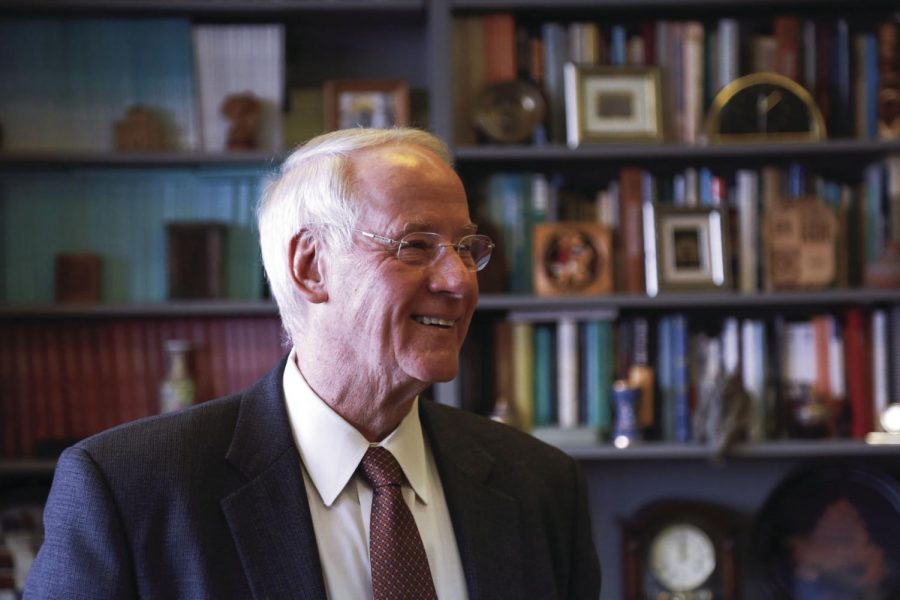First-generation students forge their own path
February 25, 2019
President of Oregon State University, Ed Ray, youngest of three sons and first in his family to graduate from college, inspired his older brothers to get their degrees and now can inspire first-generation students as well.
Ray pursues student success initiatives to make college more affordable for first-generation students. OSU offers first-generation specific resources to assist students in what Ray did not otherwise have while he was in college. The OSU president encourages not only first-generation students, but all students to work hard and pursue what they love.
First-generation students are the first in their family to attend post-secondary education. In 2018, 23 percent or 5,939 Corvallis and Ecampus OSU undergraduates were first-generation students. This is an increase of nearly 1.4 percent from the previous year.
Ray said he is using his knowledge and experiences as a first-generation student to better first-gen college careers at OSU today. He is working with the OSU Foundation to raise $150 million for scholarships for students and student success programs. In two years, they have raised $100 million. Across the university, Ray and the OSU Foundation are pursuing a number of student success initiatives with a goal of substantially increasing retention and graduation rates for all students, including first generation.
According to Ray, he faced some of the same challenges first-generation college students face today. However, he said first-generation students today have a more difficult path to success than he did, especially regarding the costs of college.
Jennie Trinh, a fourth year entrepreneurship student, said via email, “I worked every summer and throughout the school year just to make ends meet and sometimes found it difficult to make enough money.”
Trinh also said she had difficulty adjusting to the experience of college once she got in, because she did not have anyone to tell her what it would be like.
“Since my parents did not have higher education they had lower-paying jobs and could only contribute very little to my secondary education,” Trinh said via email.
First-generation students come from a variety of backgrounds and family dynamics, including families with low incomes and even middle or higher-income families without a tradition of attending college.
“I was lucky to have a very supportive family and to have friends, professors and others I could turn to for advice and support in tough times,” Ray said via email. “That’s why I tell first-gen students to believe in themselves, try to be resilient when difficulties develop, get help if they need it and persist to the best of their ability through to getting their degrees.”
Today at OSU, there are academic, health and career support services that did not exist when Ray was a student. Ray said during his education, he didn’t have anybody who could tell him what to expect from the college experience or how to navigate the system.
TRIO and the Educational Opportunities Program are intended specifically to support first-generation students. TRIO offers peer mentoring, student success courses, a summer bridge program and tutoring. Students participating in EOP get assistance with finding financial aid resources, orientation programs, counseling, course assistance, aid in finding jobs and more.
“The resources I used were TRIO and FIRST. Without these two resources, I would not have been able to accomplish some of the things I have today,” Trinh said via email.
In FIRST, mentors provide students with key information about being first-generation at OSU, and about general college life. The program also exists to help inform the university about their experiences and needs.
Trinh said FIRST has helped her network with first-gen students and faculty and allowed her to learn from them.
“Networking with these individuals has helped me by providing insights on how they overcame their obstacles and correlating it to my experiences and how it can help me further my future,” Trinh said via email.
Hannah Fitz, fourth-year digital communication arts student and marketing intern for FIRST, said she didn’t know she is a first-generation student until this year. Fitz had heard the term, but never thought it applied to her.
“I think the biggest thing the first-generation community needs to work on is finding a way to let people know that they are, in fact, first-generation students. Many students, like myself, are still unaware that they are first-generation students and it is hard to really define what it is,” said Fitz via email. “If more people are made aware of it, especially from people like Ed Ray, it will help to grow the community and allow for more resources in the future.”
As Ray puts it, everyone has a number of talents and interests. There is not one specific passion that students need to follow. He hopes students also realize their greatest accomplishments are reflected in the lives of those they help, and they should be leaders in serving others to the best of their ability.
“I think that Ed Ray is very successful and it shows that anyone can achieve their goals if they work hard enough to achieve them,” Trinh said via email.










































































































